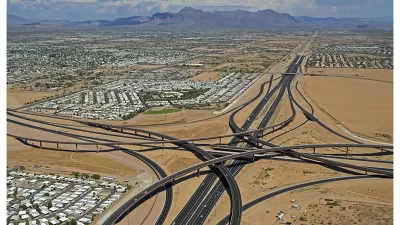Receiving a resounding vote of confidence from the Environment and Public Works Committee, the $265 billion, six-year MAP-21 reauthorization bill advanced on its path to keep federal transportation payments going to states through the summer.
As noted earlier, federal transportation reimbursements to states are due to stop in late July when a 'redline' of a $4 billion balance in the Highway Trust Fund is reached, "well ahead of surface transportation bill MAP-21's expiration at the end of September."
Department of Transportation (DOT) Secretary Anthony Fox warned on May 15, ‘‘'We’re heading for a cliff’ without highway bill," writes Keith Laing of The Hill. That highway bill, known as the MAP-21 Reauthorization Act (S.2322) got past its first hurdle the same day.
The cliff is more than just hitting the $4 billion Trust Fund balance. If MAP-21 can not be reauthorized, the gas tax expires, and with it the $34 billion a year that it collects.
"The measure that was approved on Thursday (May 15) by the Senate Environment and Public Works (EPW Committee) would reauthorize the DOT’s current level of transportation funding, which is approximately $50 billion per year, to prevent the projected bankruptcy," writes Laing. Good news for state department of transportations throughout the country, "if Congress can come up with the money," he adds.
"(T)he real challenge is over in the jurisdiction of the Finance Committee," said Sen. David Vitter (R-La.), the ranking member of the (EPW) panel. "A bipartisan finance solution is the only way forward. Such a solution is critical to the success of this bill. Without it, the bill will never move to the [Senate] floor and off the floor.” [See Sen. Vitter's video].
Indeed, the Highway Trust Fund shortfall is substantial. The bill "would require $18 billion per year in new funding that the gas tax isn’t expected to cover, according to the panel’s chairman, Sen. Barbara Boxer, D-Calif," writes USA Today's Bart Jansen.
Streetsblog's Tanya Snyder writes about many of amendments made, including "reducing the TIFIA loan program from $1 billion to $750 million a year." For those who wondered why interstate tolling, included in the president's Grow America proposal, was not included, she writes that its chief advocate, co-sponsor Sen. Tom Carper (D-Del.), dropped it after seeing that he could not reach bipartisan agreement on it.
Mark-ups made by EPW can be seen on the 42-page PDF.
According to the EPW press release, "S. 2322 will now go to the full Senate for consideration, where it will be combined with measures from the Senate Committee on Finance, Committee on Commerce, Science and Transportation, and Committee on Banking, Housing and Urban Affairs."
FULL STORY: Senate panel approves $265B highway bill

Planetizen Federal Action Tracker
A weekly monitor of how Trump’s orders and actions are impacting planners and planning in America.

Congressman Proposes Bill to Rename DC Metro “Trump Train”
The Make Autorail Great Again Act would withhold federal funding to the system until the Washington Metropolitan Area Transit Authority (WMATA), rebrands as the Washington Metropolitan Authority for Greater Access (WMAGA).

The Simple Legislative Tool Transforming Vacant Downtowns
In California, Michigan and Georgia, an easy win is bringing dollars — and delight — back to city centers.

DC Backpedals on Bike Lane Protection, Swaps Barriers for Paint
Citing aesthetic concerns, the city is removing the concrete barriers and flexposts that once separated Arizona Avenue cyclists from motor vehicles.

In These Cities, Most New Housing is Under 441 Square Feet
With loosened restrictions on “micro-housing,” tiny units now make up as much as 66% of newly constructed housing.

Albuquerque’s Microtransit: A Planner’s Answer to Food Access Gaps
New microtransit vans in Albuquerque aim to close food access gaps by linking low-income areas to grocery stores, cutting travel times by 30 percent and offering planners a scalable model for equity-focused transit.
Urban Design for Planners 1: Software Tools
This six-course series explores essential urban design concepts using open source software and equips planners with the tools they need to participate fully in the urban design process.
Planning for Universal Design
Learn the tools for implementing Universal Design in planning regulations.
Smith Gee Studio
City of Charlotte
City of Camden Redevelopment Agency
City of Astoria
Transportation Research & Education Center (TREC) at Portland State University
US High Speed Rail Association
City of Camden Redevelopment Agency
Municipality of Princeton (NJ)



























